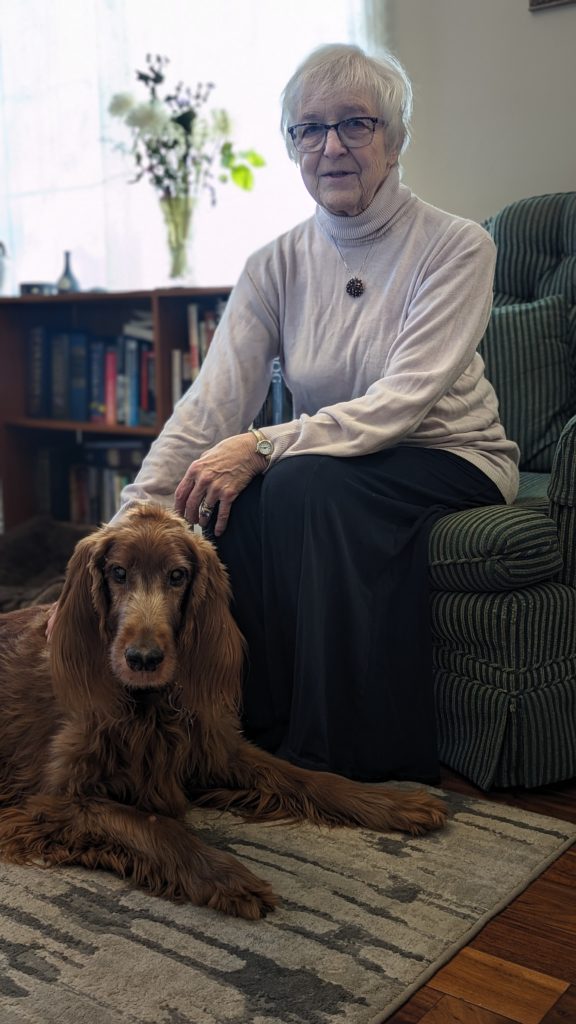This is the first installment of a new essay series by Iris Winston.
A condensed version is included in the print version of Fifty-Five Plus.
By Iris Winston
I was from away. Was I ever!

The students that I was about to meet had grown used to newcomers from other parts of Canada, generally teachers who stayed for a term or two and then returned to more familiar territory in their home province. But I was from much further away in both distance and culture and therefore more different than those other strangers from away.
The child of refugee parents, I had grown up in a big city on the opposite side of the Atlantic. I knew as little of the way of life of a remote lobster-fishing village on the South Shore of Nova Scotia as its 500 or so residents knew of a foreign urban lifestyle or someone like me who used strange words and had an unfamiliar accent.
It was to be a sharp learning curve for all of us. My teaching experience in Great Britain was limited to the practicum that was part of a post-graduate diploma in education — measured in weeks rather than months or years. It might have been more sensible for me to take a more cautious approach and teach for a couple of years on home ground before embarking on an adventure on another continent as a neophyte first-year teacher.
But I wanted to see the world. And, while I was anxious to travel, I did at least exhibit a modicum of restraint as I checked the want ads in the Times Educational Supplement. I was looking for a job that paid better than the usual annual salary of a little more than $2,000 offered a newly qualified educator in Britain during the 1960s. This was a time when distant applicants were often hired sight unseen because many countries were extremely short of teachers and their salary scales were considerably higher than the British starting salary. (And, with a job confirmed, there was no issue about immigrating to the employer’s country.)
A position on offer at a Turkish private school looked interesting. I applied and, almost by return post, received a contract. All I had to do was sign up, return the documents and head for Turkey. Everything looked fine except for a line in the fine print that noted any infraction of school regulations was subject to Turkish law.
I was adventurous, but not quite that adventurous. Uncertain where a possible disagreement about a school regulation could lead, I turned instead to a position advertised at a consolidated high school in Nova Scotia. The ad almost apologized for the salary (more than twice that offered in Britain) but promised a furnished teacherage for a monthly rent of $60. Still far from home but, as part of the Commonwealth, it sounded much more likely to be within my comfort zone.
From this point, life was a whirlwind of activity. A telegram from the Superintendent of Schools offering the job was quickly followed by the contract — no worrying notes in the fine print this time — a medical checkup and updated vaccinations, a visit to Canada House in London to learn more about my destination and then a relatively peaceful few days aboard the Empress of Canada as I set sail for Quebec City and then boarded a train to Halifax where the Superintendent had said he would meet me.
I found out later that he had not received my letter giving him details of my arrival time because it was delayed by a mail strike. (This was long before the advent of email and early computers still occupied entire rooms.) I learned from the ticket clerk that there was no train to the South Shore until the next day. My problem was solved by a kindly lawyer who had overheard my conversation with the clerk. He lived in Lunenburg and offered to drive me to his house, where I could wait until we were able to contact the Superintendent. So, my first introduction to Nova Scotia was an encounter with spontaneous kindness.
Later, when I and a couple of acquaintances were caught in a blinding winter storm on our way back from Halifax, I had a similar experience of generosity of spirit. A farming family saw that we were in trouble and took us in overnight. I believe that they saved our lives by sheltering us from the treacherous weather.
After dealing with the initial glitch in connecting with the Superintendent, and settling into the tiny teacherage, it was time to meet my homeroom class — a group of 42 Grade 11 students, most of them bigger than me and only a few years younger. I was nervous. They were wary.

Following initial greetings, I took the register and made my first mistake. Anticipating that I might make an error as I ticked off the names, I used a pencil. I did mark one name wrongly, then couldn’t find my eraser immediately.
“Does anyone have a rubber handy, please?” I asked, using the British term, rather than the North American one.
In the few moments it took for one of the boys to sidle up, grinning as he reached for his back pocket, I caught on and quickly changed my request to ask for an eraser. It was not a good beginning.
I moved on as soon as I could. What else do you do in an awkward situation of this type?
“I’m going to pass round a seating chart. Please print your names,” I requested, hoping that no one would think to mix names and places, a common trick to confuse new instructors in England.
The completed chart was returned quickly. But a couple of sniggers caused me to wonder about its accuracy. I looked down and noticed that there was a name in the front seat where no student sat. I read “Willie Makit” aloud and burst out laughing. So did several of the class. The shared humour warmed the atmosphere.
A few of the students remained fascinated by the strange differences in our apparently shared language. For instance, on one occasion, a couple delivered a long fence post to my door — their amused reaction to my referring to mail as the post.
Some students’ humour was less good-natured. One day, a pair delivered a few lobsters and offered to prepare them for me — I could not have borne dropping the poor things into boiling water — while I walked the dog (more on that later). Their apparent generosity could have had major negative consequences, were it not for my next-door neighbours, who recognized these lobsters as tinkers — lobsters that were too young and too small to be harvested. Anyone found with their shells was subject to a heavy fine. In this case, the evidence of tinkers was buried by the alert neighbours, so all was well, except for the baby lobsters in question.
Most of the time, however, the students and I had a harmonious relationship. They found out early on how much I loved animals and brought me a tiny long-haired tuxedo kitten, who grew into a very handsome and affectionate cat and eventually travelled across the country with me.
However, delivery day was somewhat chaotic. The girl, who said her father would drown the black-and-white infant if I didn’t take him, brought him to school. I emptied my largest desk drawer and lined it with paper and my sweater to give the kitten a makeshift bed for the rest of the day. Unfortunately, this was the one day in the year when the area travelling nurse was inspecting students’ hands for a skin infection. As I couldn’t shut the desk drawer and risk suffocating the kitten, I gave him the run of the classroom. A quick thinking and well-endowed student swept him up and tucked him under her breast, keeping her upturned hands close to her chest to hold him in place while the nurse examined her hands. When the nurse had finished checking the class, he was returned to the drawer until the school day was over.
Shortly after the cat’s arrival, another student brought me a three-week-old Nova Scotia Duck Toller, again telling me that her father would drown her if she couldn’t find her a home immediately. The pup stayed with me for the rest of her life, a constant joy for the next 13 years.
School days were long because students — whose surnames were often the same as the tiny places they came from — were bussed in from a wide radius. The high school had no cafeteria, so students and teachers brought packed lunches and ate in their home rooms. When the weather was bad, the students often played Bid Whist for pennies. From my vantage point at the teacher’s desk, I could see that some of them were cheating. I mentioned that I enjoyed playing cards and asked if I might join the game. My first rule was that whoever partnered me had to have done all homework before we played. It turned out to be quite a motivator as I played (dare I say cheated) more effectively than most of them and usually won. I hasten to add that I donated all my ill-gotten gains from this source to buy the students candies and other treats.
In case it’s not obvious to this point, most of the class worked very hard and we did spend a lot of time studying. At the time, Nova Scotia had provincial exams in Grades 11 and 12, so my mission was to ensure that every student passed all the classes I taught my Grade 11. That meant drilling them in exam technique more than learning all that they really needed to know, but as most of the boys disappeared in November to go lobster fishing, it had to suffice. At least passing the provincials made it possible for them to move up to the next grade and for a few to go on to further education.
One student with a very difficult home life periodically visited me after school for help with her schoolwork — an offer extended to the class in general, but taken up by only a few. One day, she asked me about a couple from away who ran a clothing warehouse in the area. She had been told that they were Jewish and were refugees from Europe, but had not met them.
“Are Jews really different?” she asked.
“You tell me. You’re sitting with one right now.”
The poor kid was too embarrassed to show up for extra help for quite a while, but, in the end, this was one of the ways she learned that being from away need not be a problem for either side.
My first Christmas with the students proved that in spades. Their generosity and the warmth of the messages on their cards truly made the holiday season a home away from home.
I eventually went west, with my dog and cat, and lived on the Prairies for the next two decades. But I will always be glad that I came from away to start my life in Canada in that tiny fishing village on Canada’s South Shore.







